16. 1990 Murray State Racers
No sixteen seed has ever defeated a No. 1 seed in the history of the NCAA tournament, but Murray State came the closest in 1990 when they forced Michigan State into overtime in the first round of the NCAA Tournament. Michigan State, a favorite to win the tournament that year, were unable to build a lead on the racers and Greg Coble hit a three pointer as time expired to send the game into overtime. The Racers eventually fell to the Big Ten champions 75-71 in overtime.
1989 East Tennessee State Buccaneers
At two points during the opening round matchup, top-seeded Oklahoma trailed by 17 points to the Buccaneers. Oklahoma was able to close the gap late by holding East Tennessee State to 30% shooting in the second half, and the Buccaneers missed a long shot at the end of the game, and Oklahoma escaped a first round upset.
1989 Princeton Tigers
East Tennessee State was not the only 16 seed making noise during the 1989 tournament. The Ivy League champion Princeton Tigers used their powerful defense and slow tempo to keep the score close with Georgetown. Princeton had a final possession and attempted two shots, but Alonzo Mourning got a key block and a buzzer-beater missed, allowing Georgetown to escape to the second round.
1996 Western Carolina Catamounts
Western Carolina had two good looks in the closing seconds of their opening round game against Purdue, including a game-winning three-pointer from the top of the key that nearly went in. Then WCU assistant Thad Matta used the game as an example when his Ohio State team entered the opening weekend as a No. 1 seed, to try and scare them to avoid a sluggish performance.
15. 2001 Hampton Pirates
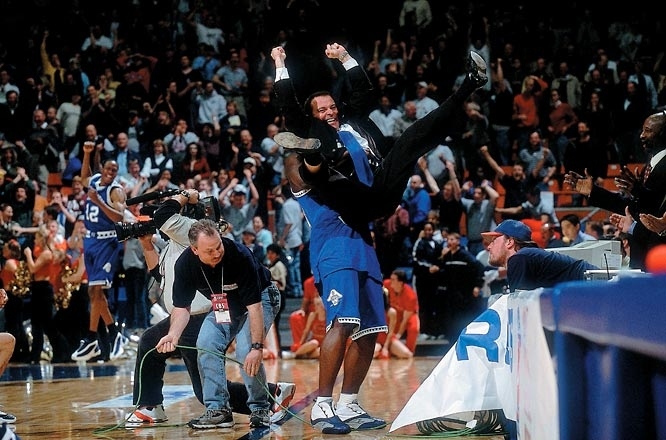
2012 Lehigh Mountain Hawks
2012 was the first year that two 15 seeds won in the first round, and the more impressive of the two was Lehigh, who outplayed Duke and won by five points. Better yet, the game was played in Greensboro, less than an hour away from Durham and Duke's campus. The Mountain Hawks would lose in the second round of the tournament to Xavier, but became one of only five 15 seeds to advance to the second round.
1997 Coppin State Eagles
The opening round matchup between lowly Coppin State and South Carolina was not expected to be close. It wasn't. Coppin State took a 55-54 lead with 6:12 left to play, and steadily built a 13 point lead over the favored Gamecocks to secure the most dominating upset in tournament history. While it remains Coppin State's only tournament victory, head coach Fang Mitchell is still coaching the Eagles to this day.
1991 Richmond Spiders
In 1991, Richmond became the first 15 seed to upset a 2 seed in tournament history, defeating a Syracuse team many people expected to have a good run, 73-69. While 1990 was known for its Cinderella teams, 1991 was known for its first round upsets, as Richmond's victory helped ensure every double-digit seed except for the 16 seed would be represented in the second round.
14. 2010 Ohio Bobcats
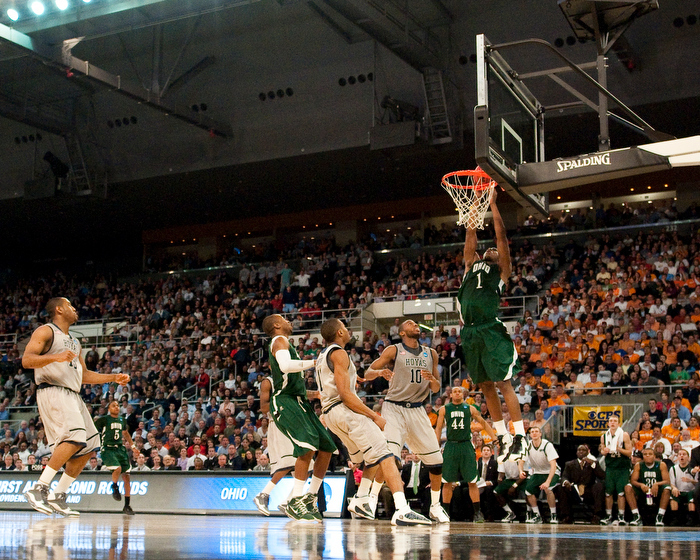
1986 Cleveland State Vikings
In 1985 the NCAA expanded the field from 53 teams to 64 teams, adding 14, 15 and 16 seeds to the tournament for the first time. By the second season, Cleveland State showed just how powerful those smaller teams could be by upsetting 3 seed Indiana in the first round, and defeating St. Joseph's in the second round before falling to Navy in the Sweet 16 by a single point. Cleveland State remains the lowest seed to advance to the Sweet 16.
1997 Chattanooga Mocs
Chattanooga is the only other 14 seed to advance to the Sweet 16, shocking Georgia in the opening round before defeating Illinois by 13 points in the second round. They too would fall in the round of 16, to 10 seed Providence. Chattanooga has been in eight NCAA tournaments and has held every double digit seeding except 11.
2005 Bucknell Bison
An exciting back and forth game that was met with extremely tough defense and a number of forced turnovers gave Kansas a chance to win with seconds on the clock, but even after a thrown inbounds pass hit its target three quarters of the way down the court, the jumpshot rimmed out, and Bucknell upset Kansas in the first round of the 2005 tournament. Bucknell would go on to win the ESPY for "Best Upset".
13. 1998: Valparaiso Crusaders
View this video on YouTube
In the opening round of the NCAA tournament with Valparaiso trailing the heavily favored Ole Miss 69-67 with under ten seconds on the clock. The Rebels Ansu Sesay miss two free throws, giving the Crusaders one final chance to score the win. They ran a play called Pacer, and the ball was immediately inbounded to Bill Jenkins, who tapped it over to Bryce Drew, who took a 23-foot 3-pointer that went in as time expired. Valparaiso would go on the defeat Florida State to advance to the Sweet 16 before falling to Rhode Island.
2006 Bradley Braves
Kansas didn't learn their lesson from Bucknell; however, and a year later met a hungry Bradley team in the opening round. Bradley upset the 4 seed Kansas by four points before defeating Pittsburgh in the following round advancing to the Sweet 16. Bradley became at that time the fourth 13-seed to advance to the Sweet 16 (Ohio would become the fifth in 2012).
1988 Richmond Spiders
Three years before Richmond became the first team to win as a No. 15 seed, they became the first No. 13 seed to advance to the Sweet 16, defeating defending champion Indiana and Georgia Tech in the opening rounds before falling to top seeded Temple. The Spiders remain the only team in NCAA history to score victories as a 12, 13, 14 and 15 seed.
1999 Oklahoma Sooners
Kelvin Sampson led the Oklahoma Sooners to unexpected upsets over Arizona (who had advanced to the Final Four the previous season) and Charlotte in the opening rounds, elevating Sampson's status and reputation as a head coach. The Sooners would eventually fall to Michigan State in the Sweet 16.
12. 2010 Cornell Big Red
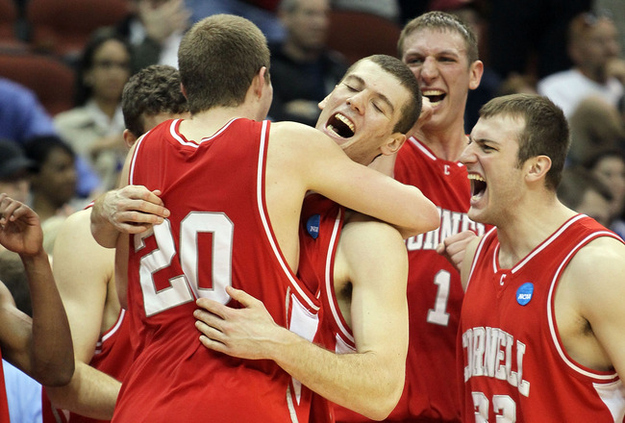
2002 Missouri Tigers
While 12 teams have advanced to the Sweet 16 a whopping 19 times, they have only advanced to the Elite Eight once, when the Missouri Tigers did so in 2002. With one of the final at-large bids to the tournament, Quin Snyder's team upset Miami and Ohio State in the opening rounds before defeating UCLA en route to the Elite Eight. They stayed tough with conference foe Oklahoma, but fell short of advancing to the final four. Still, they remain the lowest seed to ever reach the Elite Eight.
1990 Ball State Cardinals
In 1990, UNLV was untouchable in the NCAA tournament, dominating just about every game and winning the National Championship over Duke by almost 30 points. Yet it was a scrappy Ball State team that had already shocked a Gary Payton-led Oregon State team and an extremely strong Louisville team that gave UNLV a run for their money. Ball State's focus on defense and tempo control kept the game close, eventually falling to the Runnin' Rebels 69-67. It was as close as anyone would get to defeating UNLV in that tournament.
2003 Butler Bulldogs
Butler had made some noise in the tournament in 2000 and 2001, taking Florida into overtime and upsetting Wake Forest in the first round before falling to eventual runner-up Arizona. However, in 2003 they began to make their name as the it Cinderella pick, upsetting Mississippi State and Louisville in the opening rounds with two very different styles of play before falling to Oklahoma.
11. 2006 George Mason Patriots
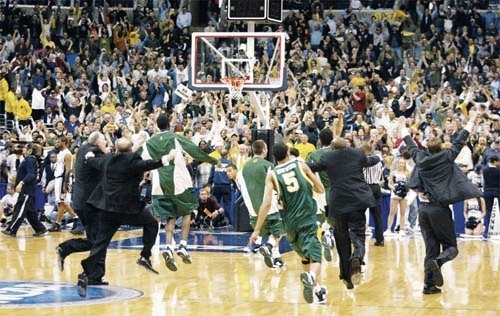
2011 VCU Rams
VCU was one of the final teams to earn an at-large bid in the 2011 NCAA tournament, relegated to the opening round "play-in" game. They defeated USC in the opening round and then went on to defeat 6 seed Georgetown and 3 seed Purdue by 18 points a piece. They were challenged by fellow underdog 10 seed Florida State in the Sweet 16, but won 72-71 to advance to the Elite Eight, where the defeated top seeded Kansas 71-61, advancing to the Final Four.
1986 LSU Tigers
Before George Mason and VCU, there was LSU, an 11 seed in 1986, LSU became the first double digit seed to advance to the final four and the only one to do it by defeating a 1 seed, a 2 seed and a 3 seed. After beating Purdue in the opening round in double overtime, the Tigers earned victories over 3 seed Memphis State, 2 seed Georgia Tech and top seeded Kentucky in close games to advance to the final four, where they lost to eventual champions Louisville.
1990 Loyola Marymount Lions
The 1990 Loyola Marymount team remains today as the highest scoring team in NCAA history, averaging 122 points per game. But that's not what makes the Lions incredible tournament run in 1990 special. In the West Coast Conference semi-finals Lions player Hank Gathers collapsed on the court and was later pronounced dead. Gathers was a second team All-American and a candidate for WCC player of the year. The Lions rallied after being awarded the WCC's automatic bid (the conference tournament was cancelled), led by teammate and friend Bo Kimble, to defeat New Mexico State, defending champions Michigan and Alabama before falling to eventual champion UNLV in the Elite Eight matchup.
10. 2008 Davidson Wildcats

1999 Gonzaga Bulldogs
In an Elite Eight run that would build a dynasty for Gonzaga. In a year full off upsets, the Bulldogs managed to capture America's attention by winning in dramatic fashion in the Sweet 16 over Florida before falling to eventual champion Connecticut in the final minute. While 1999 was only Gonzaga's second NCAA tournament, they would earn births for every tournament since, with the fourth longest active streak in the NCAA.
2002 Kent State Golden Flashes
Kent State had already made some noise in 2001, upsetting Indiana as a 13 seed in the opening round. In 2002 the Flashes made a lot of noise, scoring wins over Oklahoma State and Alabama in the opening rounds before scoring an overtime victory over Pittsburgh to advance to the Elite Eight. It would be the Hoosiers of Indiana who would get vengeance for their upset the previous year, ending the Flashes Cinderella run 81-69.
1997 Providence Friars
The team that ended Chattanooga's run was on a run of their own, defeating Marquette and Duke before facing the upstart Mocs. While the Friars got past the Mocs, they would then face eventual champion Arizona in the Elite Eight. They took the Wildcats to overtime, but fell 96-92.
9. 2010 Northern Iowa Panthers

1994 Boston College Eagles
In 1994, Jim O'Brien's Boston College squad became the first and so-far only nine seed to advance to the Elite Eight. After defeating Kelvin Sampson's Washington State team in the opening round, they upset Dean Smith's top seeded UNC squad to advance to the Sweet 16. There they upset Bob Knight's Hoosiers to advance to the Elite Eight where the fell to Florida 74-66.
2004 UAB Blazers
In 2004, the UAB Blazers stunned the overall number one seed Kentucky Wildcats in the second round of the NCAA Tournament to advance to the Sweet 16. They had previously defeated Washington in the opening round before facing the Wildcats. The Blazers were no match for a prepared Kansas team in the Sweet 16, falling 100-74.
1992 UTEP Miners
In 1992, Kansas and Duke entered the NCAA tournament as the two favorites to win the title. While Duke would live up to the hype, Kansas would be shocked in the second round by UTEP. Coming off a win over Evansville, UTEP upset the Jawhawks 66-60 to become the first nine seed to advance to the Sweet 16. They would lose, by two points, to eventual Final Four team Cincinnati in the next round.
8. 1985 Villanova Wildcats
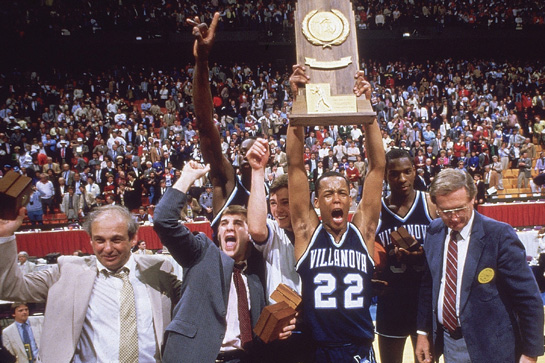
2011 Butler Bulldogs
Coming off a National Championship appearance in 2010, you'd think it would have been hard for teams to underestimate the Bulldogs again. You'd be wrong, as Butler powered through the Southeast Regional, defeating top seeded Pittsburgh, second seeded Florida, fourth seeded Wisconsin and ninth seeded Old Dominion. They wouldn't face a double digit seed until the took on VCU in the Final Four, advancing to their second straight National Championship game.
2000 UNC Tarheels
The year 2000 was the year of the eight seed. For the first time in tournament history, two eight seeds advanced to the Final Four. UNC was one of the two, upsetting top seeded Stanford in the second round and adding victories over four seed Tennessee and seventh seeded Tulsa on their way to the Final Four.
2000 Wisconsin Badgers
Wisconsin was the other eight seed to succeed in 2000, following an extremely similar path to UNC. They upset Arizona in the second round, adding victories over fourth seeded LSU and six seed Purdue before advancing to the Final Four. Both UNC and Wisconsin would lose in the Final Four, each by 12 points.
7. 1986 Navy Midshipmen
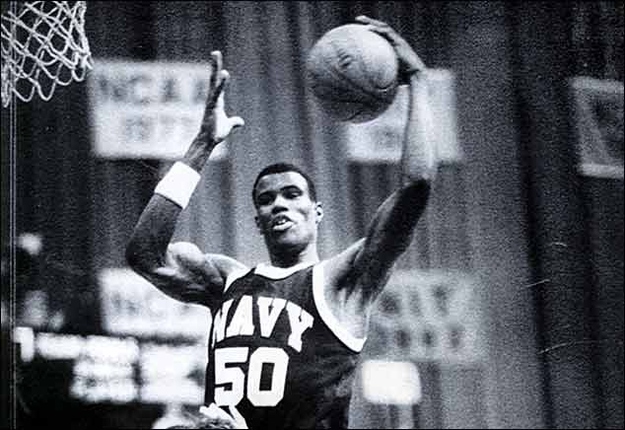
2004 Xavier Musketeers
After upsetting then undefeated St. Joseph's in the Atlantic 10 tournament, Xavier carried that momentum into the NCAA tournament, knocking off ten seed Louisville before upsetting second seeded Mississippi State and third seeded Texas, before falling to Duke in the regional final by three points. It remains the closest a 7-seed has come to making the final four in the 64-team era.
1993 Temple Owls
In 1993 the Temple Owls were able to do what second seeded Arizona was unable to do: defeat Santa Clara. After knocking off Missouri and Santa Clara in the opening rounds, the Owls upset third seeded Vanderbilt before falling to eventual runner-up Michigan (though Michigan would later vacate the season).
2012 Florida Gators
Much like Temple, Florida was able to take advantage of a 15-2 upset and advance to the Sweet 16 with dominating wins over Virginia and Norfolk State. They then defeated third-seeded Marquette to advance to the Elite Eight, where the fell to Louisville by four points, keeping the seven seed shut out of the Final Four.
6. 1988 Kansas Jayhawks
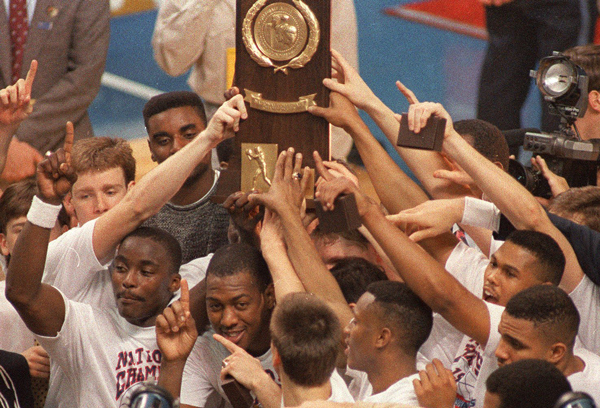
1987 Providence Friars
A year before the Jayhawks made their title run, Providence showed that six seeds were a force to be feared, upsetting second seeded Alabama and top seeded Georgetown to win the Southeast region and advance to the Final Four. They would fall to Syracuse in the National semi-final.
1992 Michigan Wolverines
In 1992, a six seed again made it to the national title game, this time with Michigan defeating two seed Oklahoma State, top seeded Ohio State and four seed Cincinnati to advance to the title game. However, Michigan was eventually forced to vacate their Final Four victory and National Championship appearance in a settlement with the NCAA, yet their victories in the Southeast Region stand.
2010 Tennessee Volunteers
Since 1992, no six seed has advanced to the Final Four. Tennessee came the closest in 2010, when they fell to Michigan State by one point in the Midwest Regional Final. They had previously earned victories over San Diego State, Ohio and Ohio State before falling to the Spartans.
5. 2010 Butler Bulldogs
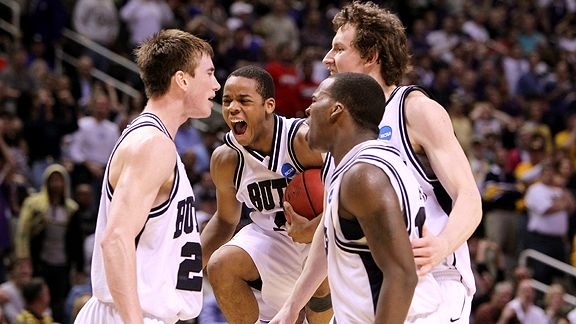
2000 Florida Gators
The Bulldogs were not the first five seed to advance to the title game. That honor belongs to the Florida Gators who, in 2000, upset Duke and defeated Oklahoma State en route to the Final Four. They then defeated another Cinderella, eight seeded North Carolina before falling to Michigan State in the championship game.
2002 Indiana Hoosiers
Indiana had an unexpected Cinderella run of their own in 2002, upsetting Duke amid three games against double digit seeds to advance to the Final Four. There they upset second seeded Oklahoma to advance to the National Championship against Maryland. The Hoosiers were no match for the Terrapins. It would be the Hoosiers last National Championship appearance, as the program began to fall apart soon afterwards. It also the only time the Hoosiers appeared in the title game and failed to win.
2005 Michigan State Spartans
Michigan State is the only team to advance to the Final Four as a five seed twice, in 2005 and 2010. In 2005 they upset top seeded Duke and second seeded Kentucky before falling to eventual champion North Carolina in the National Semifinals, in a year where North Carolina and Illinois were heavily favored to meet in the championship (and they did). Michigan State would advance to the Final Four again in 2010, only to lose to Butler.
4. 1997 Arizona Wildcats
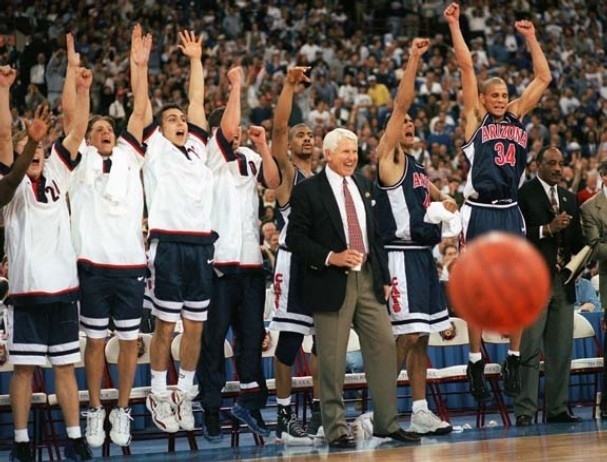
1996 Syracuse Orangemen
Syracuse managed to advance to the National Championship without facing a single one seed until Kentucky in the title game. The Orangeman in fact only defeat one lower seed, second seeded Kansas, in the entire tournament. Still, Syracuse held their own against Kentucky, but in the end they were no match for the Wildcats, falling 76-67.
1990 Georgia Tech Yellow Jackets
Georgia Tech made their first Final Four run in 1990, winning in dramatic fashion. The regularly defeated opponents by two or three points in high scoring games, and became one of the first teams to advance based on three point shooting. The Yellow Jackets would fall to eventual champions UNLV in the National Semifinals, 90-81.
1995 Oklahoma State Cowboys
Oklahoma State advanced to the Final Four in 1995, defeating top seeded Wake Forest and second seeded Massachusetts before falling to eventually champion UCLA in the National Semifinals. The Cowboys had earned their first Final Four birth since 1951. It was the breakthrough success of the Eddie Sutton era, and catapulted the Cowboys into the Big 8 (later Big 12) elite for years to come.
3. 2003 Syracuse Orangemen
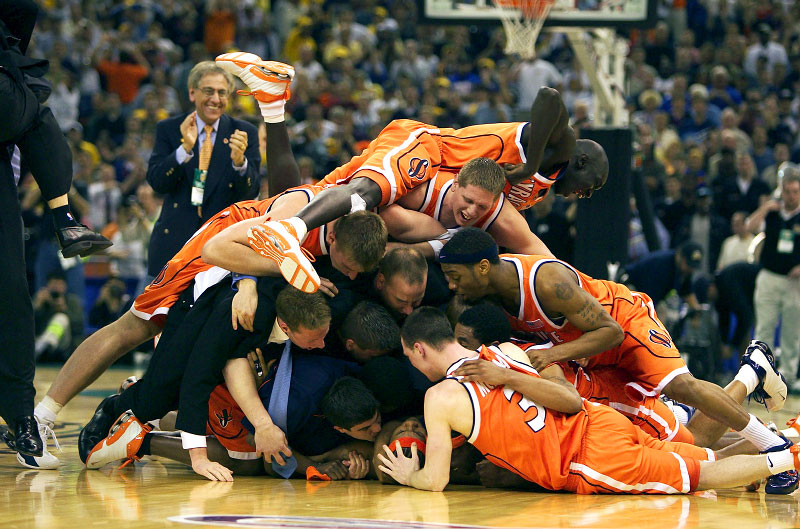
1989 Michigan Wolverines
Just prior to the start of the 1989 NCAA Tournament, Michigan fired head coach Bill Frieder who had announced he was taking a job at Arizona State following the completion of the tournament and replaced him with Assistant Coach Steve Fisher as interim head coach for the tournament. Fisher was not expected to retain the head coaching position in 1990, but that changed when Michigan went on an unexpected run and defeated fellow three seed Seton Hall for the national title.
2006 Florida Gators
In 2006 Florida won their first ever NCAA title on the back of Joakim Noah, who would be named tournament MVP. The Gators would take advantage of a tournament full of upsets to advance to the title game against UCLA, where Billy Donovan's squad would dominate, defeating UCLA by 16 points.
2011 Connecticut Huskies
Connecticut took advantage of one of the weakest tournament fields in NCAA history and took their third National Championship in 2011, defeating Butler 53-41 in a game that saw low scoring and poor shooting. Connecticut remains one of the only teams that won a title without defeating a one seed, earning it's biggest victory over second seeded San Diego State.
2. 1991 Duke Blue Devils
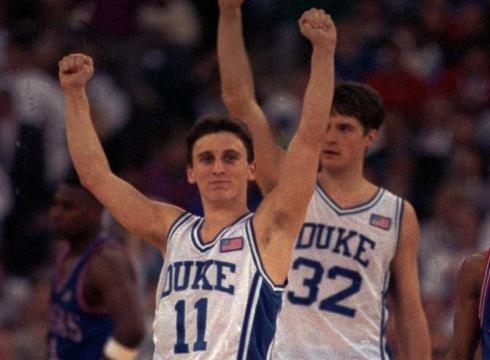
2004 Connecticut Huskies
With just three minutes remaining in the National Semifinal matchup, the Connecticut Huskies trailed Duke by eight points, and it looked the their second national title was slipping out of reach. However, the Huskies held the Blue Devils scoreless throughout the final four and a half minutes of play (minus a meaningless three hit as time expired) to advance to the National Championship, where they would easily defeat Georgia Tech.
1986 Louisville Cardinals
Until their title game against Duke, no one came close to defeating the Cardinals, winning each matchup by at least eight points and several in double digits. Head coach Denny Crum's success under the old NCAA format would prove to translate to the 64 team field, and his national title would propel them to another stream of success in the tournament.
1998 Kentucky Wildcats
In his first year as head coach of the Wildcats, Tubby Smith lead a team that would become known as the "Comeback Cats" for their ability to comeback after suffering large deficits in tournament play. They came back in three games, including a 17 point come back against top seeded Duke in the Elite Eight, and defeated Utah in the National Title game to earn Smith his first championship.
1. 1990 UNLV Runnin Rebels
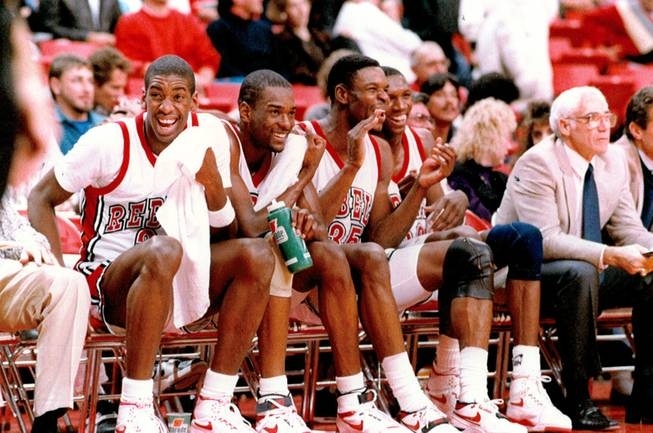
2012 Kentucky Wildcats
No one came close to defeating Kentucky during the 2012 tournament, winning every single game by at least eight points and advancing out of the South Regional with four double-digit wins in four games. They easily controlled the tempo of each matchup and the scores often looked closer than the actual games. This wasn't the first such run for the Wildcats, they had previously dominated the tournament in 1996, winning each game by at least nine points.
2000 Michigan State Spartans
Michigan State won every single game of the 2000 NCAA Tournament they played in by double digits, one of the only teams in tournament history to do so. In a tournament full of upsets, it was the favored Spartans who would take home the tournament title, earning coach Tom Izzo his first championship and Michigan State's Spartans their second.
1992 Duke Blue Devils
It's hard to believe that one of the most famous baskets in NCAA Tournament history, Christian Laettner's jumper as time expired occurred not in the National Championship or the Final Four, but rather in the East Regional Final. Considered one of the best basketball games ever played, Duke scored a single point victory over the Wildcats to advance to the Final Four, where they would edge out Indiana and then dominate Michigan to win their second consecutive title.


